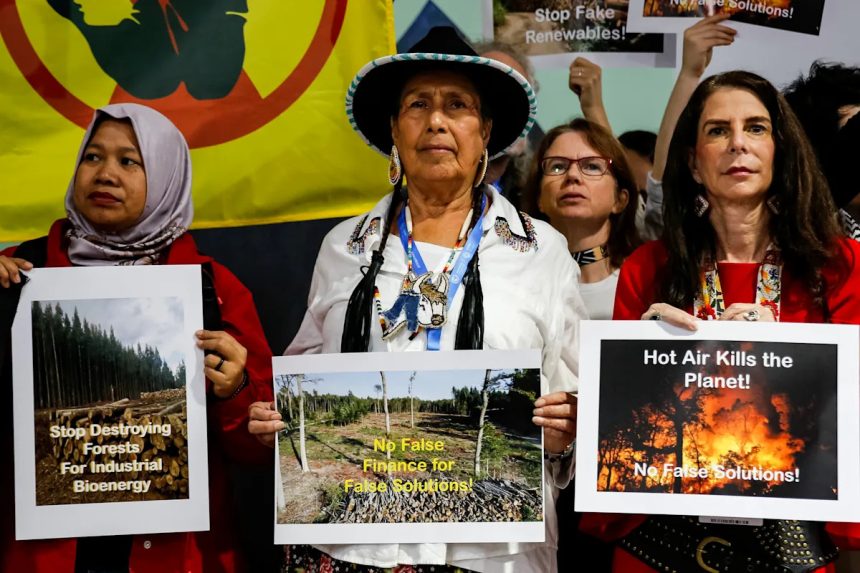In 2013, California launched its cap-and-trade program, a carbon credit market that allows companies and governments to engage with offset projects that incentivize investments in planting trees, preserving forests, or even supporting solar farms. The idea is to reduce or offset greenhouse gas emissions by purchasing credits for nature-based projects.
Initially, the Yurok Tribe expressed interest in joining the program. The market would provide additional revenue and would enable the Yurok to play an additional role in addressing climate change. But Frankie Myers, an environmental consultant for the tribe and former vice chairman, had doubts.
“This idea of you can pay-to-pollute was something that I was very, very concerned about,” he said. “I was very concerned with how that lined up with our cultural values as a tribe.”
The Yurok Tribe’s carbon offset project in Northern California includes 7,600 acres of a tribally-managed forest: mature evergreen, fir, and redwood trees, ideal for carbon sequestration. When the tribe joined the state’s program in 2014, private consultants and brokers oversaw the project due to the nation’s limited funds, removing the tribe’s ability to manage the forest in a way that aligned with Yurok values. Four years later, revenue began to climb and the nation took over management. It was then that Myers began to see the benefits of a tribal-led carbon offset project. Since the Yurok Tribe joined the cap-and-trade program, at least 13 Indigenous nations in the U.S. have launched their own offset projects on California’s marketplace.
Originally, the program was slated to end this year. However, last week, California Governor Gavin Newsom extended the state’s cap-and-trade program until 2045. The “action comes as the Trump administration continues its efforts to gut decades-old, bipartisan American clean air protections and derail critical climate progress,” Newsom’s office said.
The tribal economy for the Yurok Nation before their project relied on discretionary funds from the federal government and gaming revenue, but Myers said that the tribe has now received tens of millions of dollars in carbon credit sales, boosting their economy and funding environmental projects like and Klamath recovery work in the wake of dam removal.
But critics of carbon markets remain staunchly opposed to the programs, alleging that the scheme perpetuates colonialism, incentivizes the theft of Indigenous resources, and allows companies to essentially pay to keep polluting without having to change their activities. Even today, Myers agrees.
“I do think the concerns they bring up with carbon offsets are absolutely valid 100 percent,” he said. “I think we do fully grasp the concerns that organizations have with carbon offsets and having seen the market from the inside, they have valid concerns.”
According to a 2023 report on carbon markets by Landesa, a nonprofit focused on land rights around the world, offset projects can have negative impacts on Indigenous communities including displacement and land dispossession. In Brazil, tribes near the Amazon have experienced “green land grabs” driven by carbon offset projects. In Kenya, a soil-storing project with investments from Meta and Netflix has reportedly uprooted the traditional pastoralist culture of Indigenous Kenyans, including Maasai, Samburu, Borana, and Rendille, near the site. Reports like this have led Landesa to provide recommendations on proposed legislation in Kenya such as the Natural Resources Bill, which clarifies the rights local communities have over land resources.
However, Juan Robalino, one of the report’s authors, said that carbon markets, if done right, are beneficial for communities committed to environmental stewardship. “The influence of Indigenous people and local communities in this space of carbon markets has been action from governments, per se, to set up regulatory frameworks regarding carbon rights as well as carbon trading,” he said.
Alongside the efforts to ensure credits possess environmental integrity, that is if projects actually promote carbon offsets, Robalino notes that social integrity, or how these projects impact communities, is a recent demand by market participants and “related to respecting the rights, of the community [and] thinking more about moving from principles to actually actionable actions, setting up processes, systems, mechanisms that actually take these principles and put them on the ground.”
Both Robalino and Myers think regulation is the best way to minimize harm towards Indigenous groups on both the sellers and buyers end. Myers wants higher carbon pricing as a way to enact better controls on what type of project is sold on the market and for companies to reflect a deeper commitment to mitigating climate change than satisfying its net zero pledges.
According to Robalino, there is no mechanism to regulate carbon markets at the international level. The upcoming COP30 may address this, but advocates such as the Indigenous Environmental Network, have called for a moratorium on carbon markets repeatedly, representing an ongoing and growing resistance to how these programs impact Indigenous communities.
However, in Canada’s British Columbia, First Nations including the Council of the Haida Nation manage forest carbon projects from an Indigenous-led conservation framework while in Australia, the government’s Carbon Farming Initiative supplies credits to Aboriginal farmers who utilize traditional knowledge of land management towards projects.
For tribes interested in launching their project? Myers has three points of advice. “You have to have ownership of it. You have to have control of it, and become a hyper-focused organization on who you’re partnering with and who you’re selling to,” he said. “Don’t move away from your traditional values at whatever cost.”
This story was originally published by Grist with the headline California extends cap-and-trade, as Indigenous nations grapple with the trade-offs on Sep 29, 2025.









